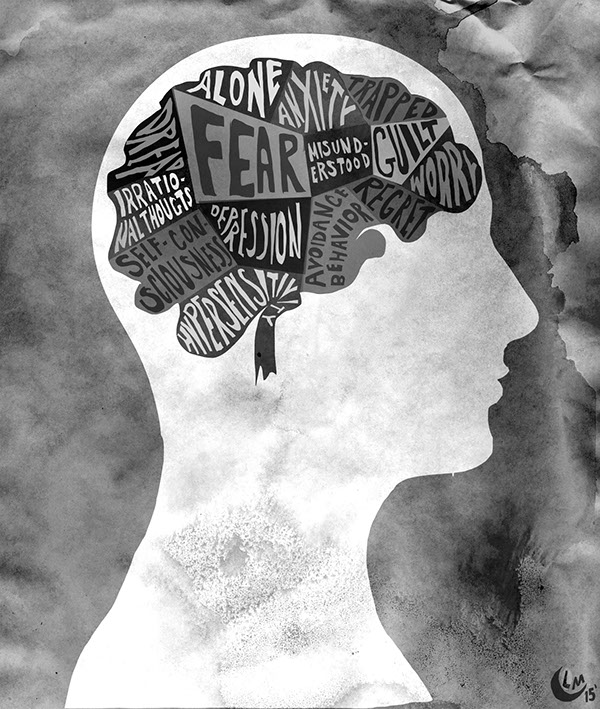Social anxiety can leave a person feeling intensely fearful and awkward in, and around, social situations. Day to day life can be massively impacted and influence our interactions with others to the point where our relationships and even our work lives suffer. The anxiety often doesn’t end when the socialising ends either, we may find that we ruminate over things we’ve said or not said,or things we did or didn’t do. There’s a sensitivity to the thought of being judged, appearing rude or aloof, and of never really fitting in. We might find that we avoid social situations as much as possible which can lead to us feeling lonely and isolated. When we can’t avoid the social situation, we might find that we constantly go over and over what we might do or say in response to certain situations and conversations. Needless to say, it can be extremely exhausting.
1. Self-Consciousness
Excessive self-consciousness can take hold, particularly when we are in social situations. It can feel impossible to keep eye contact with the people we’re speaking to. We might find ourselves hiding behind our hair or behind the bill of a hat. Our speech can become quiet because we don’t want to draw attention to ourselves, or we might talk rapidly because we feel so nervous.
2. Intense Worry
Upcoming social events can cause havoc with the social anxiety we experience, causing us to feel intense worry. This could range from worrying hours before an event to days, weeks, or even months. We could be worrying about what to wear, who might be there, or what they might say and how we should respond, whether we will look or say something inappropriate or if we’ll fit in. Often we will worry about how we can get out of it or how we’ll be able to escape if we need to. It can be a never-ending conveyor belt of thoughts and “what if” questions.
3. Avoidance
Anxiety about social situations can bring about an urge to avoid them, which leads to what is called “experiential narrowing” as we lessen the activities and people in our life to only those that we feel comfortable with. It can mean that we miss out on events that we really want to go to. We might not see our friends or family as often as we’d like to. The thought of social situations can make us feel so unwell that going to them feels impossible.
4. Physical Discomfort
There are loads of physical symptoms that we could experience if we’re living with social anxiety. These could include things like feeling nauseous, sweating, increased heart rate, blushing, shaking, feeling dizzy, feeling faint, and diarrhea. These symptoms can feel embarrassing, and this embarrassment can increase our anxiety and make them even worse. It can be a vicious cycle.
5. Negative Thought Patterns
Social anxiety can cause us to have extremely negative thoughts about ourselves. Even if we receive 10 positive comments, and one mediocre comment, we will take the mediocre comment as a negative and run with it. We often have very low self-confidence and don’t think much of ourselves. We can feel like a burden and think that people don’t really want us around and are just ‘putting up with us’. Conversations we’ve had can play on our mind for weeks on end as we wonder if we got it ‘right’, or if we said/did something ‘stupid.’ These negative thoughts can overwhelm any positives we might feel about ourselves. The more we think them, the lower our confidence sinks, the lower our confidence sinks, the more negative thoughts we have. Another cycle takes place.
6. Safety Behaviors
We will often try to manage the symptoms of social anxiety by modifying our behavior. This could include things like making sure we always have someone with us or knowing how we’ll get home. Choosing to spend less time in larger groups and preferring smaller gatherings. While many of these behaviors can seem harmless and constructive, they still manage to leave us at the mercy of our anxiety. While others, like relying on alcohol to manage symptoms, can lead to (you guessed it) another cycle occurring in which alcohol becomes the predominant mode of relief leading to the need to increase the amount of alcohol over time used.
7. Difficulty Functioning When Others are Watching
Many of us find that we struggle to do things if there is someone watching us. This could include things like making a phone call, eating food, or standing at the copier at work. It could be based on walking into a room full of people on our own, putting our hand up to ask a question at an event, or trying to avoid a sneeze because we don’t want everyone to look our way.
Social anxiety is so much more than ‘shyness’ and it’s typically where fear of social situations is long-lasting and disruptive. It’s a fairly common condition that can start to affect us in our early years and is treatable with the right help and support.
If you, or someone you know, are struggling with social anxiety, consider contacting me at (717) 288-5064 / gregghammond@restoringbalancelancaster.com and schedule an appointment today.

